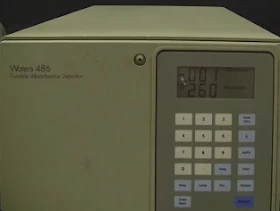HPLC detectors are used in the detection of the solute present in the eluent coming from the HPLC column. They are capable of determining the identity and concentration of eluting compounds in the mobile phase. There are specific detectors which respond to a specific compound and their response is not dependent on mobile phase composition.
However, the response of the bulk-property detectors is dependent on the collective changes in the composition of the mobile phase and sample. There is a broad range of detectors available for different sample requirements. Some of the crucial features required of a detector include sensitivity, a linear response and either a universal or selective response.
Some of the desirable features required in HPLC detectors are:
Some of the desirable features required in HPLC detectors are:
2. Sensitivity towards solute over mobile phase.
3. It should have a response to solute and not the mobile phase.
4. It should have a low cell volume for memory effects minimization.
5. It should respond linearly to solute concentration.
6. Low detector noise and detection limits.
7. It should not contribute to zone spreading.
8. It should be not be affected by temperature variation and flow rate.
The different types of detectors are categorized into two, i.e. specific and bulk property detectors.
A) Specific HPLC Detectors
1. Mass Spectroscopic HPLC Detectors
Mass spectroscopy detectors offer very high selectivity and sensitivity and their detection is based on molecular fragmentation by electric fields and separation based on the mass to charge ratio of fragmented molecules. New application areas have been introduced by the LC-MS technique because of its advantages in terms of sensitivity and resolution.
They are of three types, i.e. fixed wavelength detectors, variable wavelength detectors and the diode array detectors. UV-VIS Detectors have mostly used detectors due to its specific response to the class of compounds or particular compounds depending on the functional groups of eluting molecules that absorb light, although some compounds with no light absorbing groups give suitable response after post-column derivatization to introduce light absorbing entities. A beam of the electromagnetic radiation is passed through the detector flow cell and due to this interaction, it experiences a change in intensity and the measurement of this particular changes is the basis of most optical detectors.
3. Photo Diode Array (PDA) HPLC Detectors
3. Photo Diode Array (PDA) HPLC Detectors
A large number of diodes serving as detector elements makes it possible for simultaneous monitoring of many absorbing components at differing wavelengths, with little time and reduced cost spent on expensive solvents.
4. Fluorescence HPLC Detectors
They are most specific, sensitive and selective, and offers greater sensitivity than the UV-VIS detector. Naturally fluorescent compounds are less as compared to the light absorbing compounds, a limitation solved by post-column derivatization. There are three types of fluorescent detectors, namely the single wavelength fluorescent detector, multi-wavelength fluorescent detector and laser-induced fluorescent detector.
B) Bulk Property HPLC Detectors
1. Electrical Conductivity HPLC Detectors
They provide reproducible, universal and high sensitivity detection of the charged species and surfactants. The detectors measure the conductivity of the mobile phase, therefore are classified as bulk property detectors. Their sensors consist of the flow-through cell with few microliters of the volume containing 2 electrodes, usually made of stainless steel, platinum or a noble metal used in the determination of alkali and alkali earth metals.
2. Refractive Index HPLC Detectors
There are various types of RI detectors which include, the Christiansen effect detector, interferometer detector, thermal lens detector and the dielectric constant detector. They have limited sensitivity and detection depends on the changes in refractive index of eluting molecules in the mobile phase. These detectors are used for detecting non-ionic compounds that neither fluoresce nor absorb in the UV region. Temperature control is required due to high-temperature sensitivity.
The detectors can be classified into two, which are the equilibrium and the dynamic detectors. They respond to oxidizable or reducible substances and are sensitive to changes in flow rate or composition of the mobile phase. The reaction takes place on the surface of the electrode producing electrical signals. Their suitability will depend on the volumetric characteristics of the solute molecules in the aqueous or organic mobile phase. They require the working electrode, reference electrode and the auxiliary electrode.
4. Light Scattering HPLC Detectors
4. Light Scattering HPLC Detectors
Light scattering detectors are of two types which include low angle laser light scattering detector and the multiple angle laser light scattering detector. They are based on measuring the scattered light and are useful for detection of large molecular weight molecules present in the eluent, which is examined by being passed through an appropriate sensor cell depending on molecular sizes.
Other types of HPLC detectors are the evaporative light scattering detectors, IR detector, transport detectors, aerosol-based detectors, chiral detectors and the pulsed amperometric detectors.


Along with detectors if their purpose/ application is also given then article more useful to the Analyst/ Scientist.
ReplyDeleteDr Satya Prakash, Former Director
Nice
ReplyDelete